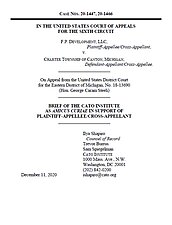Learn more about Cato’s Amicus Briefs Program.
In 2018, F.P. Development cleared a narrow strip of trees on its industrially zoned property to access a drainage ditch that had become clogged and was causing flooding. The town of Canton, Michigan is demanding $47,898 in mitigation penalties from F.P. under its tree ordinance, which requires that private property owners pay the city for removing trees from their own private properties. F.P. refused and filed suit against the city, arguing that the fine was either an unconstitutional exaction (that is, requiring something of landowner as a condition of using or developing the property) or a violation of the Takings Clause of the Fifth Amendment, which ensures that private property cannot be taken except for public use and with just compensation.
F.P. argues that the tree ordinance abridges a fundamental attribute of ownership, the right to alter your property for gainful use, and is thus a per se violation of the Takings Clause. The ability to alter your property to fit your tastes, especially to mitigate harmful flooding, should not be so easily violated by a town ordinance. The district court held for F.P. on a different takings theory and rejected its per se claim. It did, however, find an exaction.
Now on appeal to the Sixth Circuit, the Cato Institute has filed an amicus brief endorsing F.P.’s exaction theory and arguing that a fundamental attribute of ownership cannot be casually violated without just compensation. Local governments can pass ordinances to prevent harmful uses, and they can regulate to create “reciprocal advantages” between neighbors who share the same regulatory burden. Since neither is present here, the Sixth Circuit should agree that the ordinance is unconstitutional.
The Supreme Court has held that even slight physical invasions are per se takings, as are regulations that result in a total loss of a property’s value. The Court has gone further to suggest that all interferences with the fundamental attributes of ownership—those which have been part of the Anglo-American legal tradition for centuries—are takings of that attribute, whether or not other sticks and twigs in the proverbial “bundle of rights” remain.
F.P. clearly had the right to remove the trees, and the town cannot fine them for it. For one, according to its expert arborist, removing the trees was “good forestry practice” because it targeted maturing trees competing with younger ones, furthering the ordinance’s express purpose of promoting “an increased quality of life through the regulation, maintenance and protection of trees, forests, and other natural resources.” Second, Canton is punishing F.P. for removing some trees to clear an obstructed drainage ditch that is the county’s responsibility to maintain. Third, F.P. does not benefit from a reciprocal advantage because some landowners are arbitrarily exempt.
There is thus no excuse for Canton’s interference with F.P.’s fundamental right to discretionary use of its property. And since the ordinance does not allow for a site-specific analysis to calibrate mitigation, there will be cases in which Canton punishes tree removals that benefit the community.
Canton’s tree-removal ordinance is emblematic of municipal laws around the country that appear to be workaday regulations but in fact deprive owners of their fundamental rights. These unconstitutional regulations disincentivize countless commercial activities that could greatly benefit their communities. It is time the courts take seriously interferences withfundamental attributes of ownership.

This work is licensed under a Creative Commons Attribution-NonCommercial-ShareAlike 4.0 International License.


